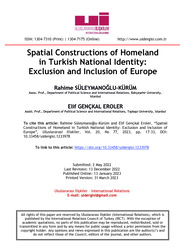Spatial Constructions of Homeland in Turkish National Identity: Exclusion and Inclusion of Europe
-
Yazar
Elif Gençkal Eroler
-
Tür
Makale
- Yayın Yılı 2023
- Veritabanları TR-Dizin
- DOI 10.33458/uidergisi.1233978
-
Yayıncı
Dergipark
- Dergi ULUSLARARASI İLİŞKİLER | INTERNATIONAL RELATIONS 20, ( 77 ), pp.17 - 33
- Tek Biçim Adres https://hdl.handle.net/20.500.14081/1900
-
Konu Başlıkları
Space, Turkish Homeland, Anatolia, Supranationalism, Blue Anatolianism
Turkish Homeland
Supranationalism
Blue Anatolianism
This paper focuses on the geographical, historical, and cultural spatializations of Turkish national identity by political elites in the post-2000 era. Considering the close link between the formation of national identity and the spatial constructions of homeland, the paper shows that Turkish national identity since the foundation of the Republic has been constructed through different supranational visions, navigating through different civilizational ingredients. We show that the Kemalists’ Western-oriented or Eurocentric geopolitical discourses, which perceive Turkey as a “bridge country”, have been transformed in the postCold War era into a more ambitious geopolitical discourse of a “central country”, which aims to broaden Turkey’s “identity space” through its Ottoman heritage. In line with this transformation, in the 2000s, the Turkish homeland was imagined as the “cradle of civilizations”, but the national identity did not develop as a counter-hegemonic measure against the West (Europe). The post-2010 era – with a pronounced emphasis on Islamic culture and Ottoman geopolitical space – constitutes a departure from the previous years’ spatial and identity constructions of Turkey, in the sense that the political elites’ perception of national identity has never gone beyond the national frontiers to this extent, and the West (Europe) has never been so trivialized in terms of progress and civilization.
-
Koleksiyonlar
Fakülteler
İktisadi İdari ve Sosyal Bilimler Fakültesi


 Tam Metin
Tam Metin

